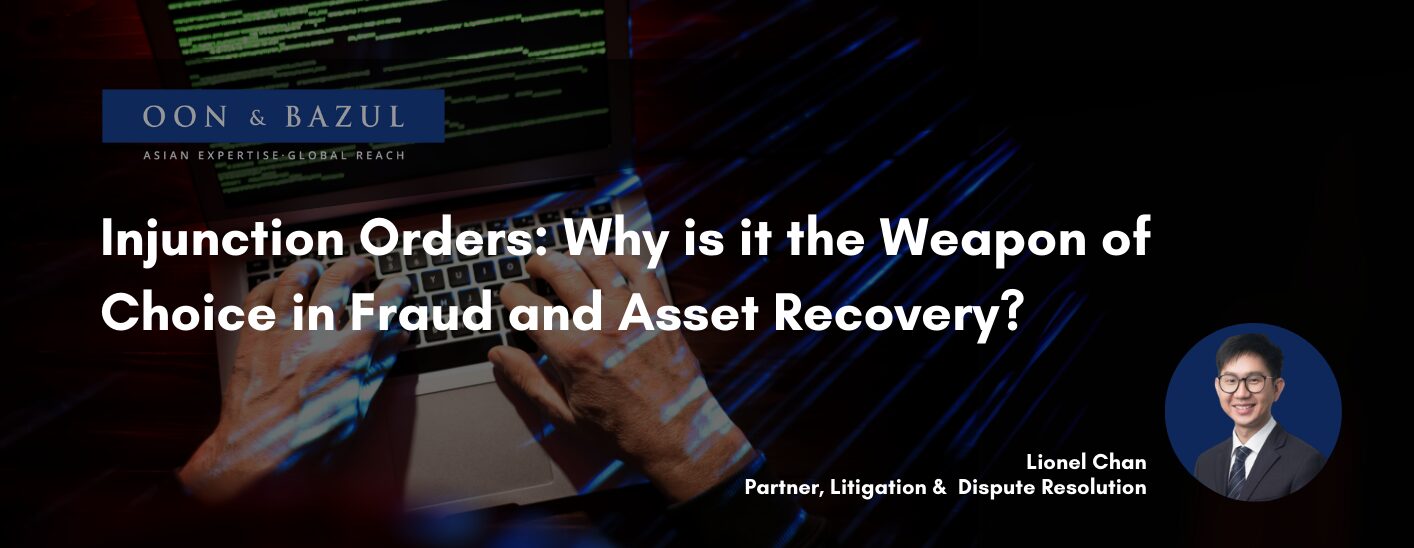Injunction Orders: Why is it the Weapon of Choice in Fraud and Asset Recovery?
In the world of litigation, particularly for fraud and asset recovery, injunction orders are among the most powerful tools available to courts. These legal directives compel or restrain specific actions, playing a critical role in preserving assets, protecting rights, and/or preventing harm. However, their effectiveness hinges on one crucial factor: compliance.
As reported by The Straits Times on 3 February 2025 regarding the case of Ho Kai Xin v. ByBit Fintech, breaching an injunction order can lead to severe legal and financial consequences.
A Recent Case That Highlights the Stakes
In this high-profile matter concerning a cryptocurrency fraud perpetrated by an employee, Ms. Ho Kai Xin was found guilty of contempt of court for flouting injunction orders issued by the Singapore High Court. Despite being explicitly barred from using stolen cryptocurrency funds worth $5.7 million, Ms. Ho spent nearly $840,000 on luxury purchases, including a freehold penthouse and designer goods.
Her blatant disregard for the court’s authority resulted in a six-week jail term for civil contempt—a stark reminder that breaching an injunction will bring about not merely a slap on the wrist, but a serious offense with significant penal repercussions.
This case underscores two key principles about injunction orders:
- Compliance Is Non-Negotiable: Courts do not issue injunctions lightly. These orders are designed to maintain fairness and prevent irreparable harm. Violating them demonstrates contempt for the judicial process and attracts punitive action.
- Penalties Are Severe: Contempt of court carries significant penalties, ranging from fines to imprisonment.
Why Injunctions Work… Within Jurisdiction
The effectiveness of an injunction lies in its enforceability. When defendants are within the jurisdiction of the issuing court, non-compliance can lead to serious sanctions, fines, or – as seen in Ms. Ho’s case — even imprisonment. This enforcement mechanism ensures that injunctions carry real “bite.”
However, what happens when the defendant is outside the court’s reach?
If a party subject to an injunction resides or operates abroad, enforcing the order becomes more challenging. While courts retain the power to hold such parties in contempt, practical limitations arise. Without cooperation from foreign jurisdictions, a contempt order may lack teeth. For instance, if Ms. Ho had fled Singapore after receiving the injunction, it would have been far more difficult for ByBit to secure meaningful redress through domestic legal channels alone.
For this reason, it is often necessary to also secure a similar injunction in a foreign jurisdiction where the defendant is located, if their whereabouts are known.
Lessons for Claimants
For claimants seeking to protect their interests, obtaining an injunction is an important half of the battle. Ensuring compliance, however, requires vigilance and strategic planning, especially when dealing with cross-border transactions or overseas counterparties. Here are some actionable takeaways:
- Act Swiftly: If you suspect wrongdoing, act quickly to obtain an injunction before assets can be dissipated. Time is of the essence to prevent irreparable damage.
- Monitor Compliance: Where possible, regularly track whether the opposing party adheres to the terms of the injunction. Any signs of non-compliance should prompt immediate legal action.
- Consider International Dimensions: For cases involving foreign entities or individuals, explore avenues for international enforcement or determine whether securing an injunction in the jurisdiction of the defendant’s place of residence is necessary.
- Seek Expert Guidance: Navigating complex legal frameworks requires specialized knowledge. Engage experienced fraud and asset recovery lawyers who both understand local laws and are familiar with handling disputes with cross-border elements.
Conclusion
The story of Ms. Ho Kai Xin serves as a cautionary tale about the importance of respecting court orders. An injunction is not just a piece of paper—it is a binding order backed by the full weight of the law. Breaching it carries severe consequences, as Ms. Ho discovered firsthand. Yet, while injunctions are potent tools within jurisdictional boundaries, their efficacy diminishes when enforcement crosses borders.
Whether safeguarding assets or ensuring accountability, understanding the scope and limits of injunctions empowers us to make informed decisions to safeguard our interests.
This article was authored by our Partner Lionel Chan. The author thanks Legal Trainee Nicolle Cheung for her assistance with the article.
At Oon & Bazul LLP, we have been heavily involved in navigating multi-jurisdictional disputes. Our expertise spans a vast range of industries and regions, from Asia to North America. One of our landmark cases include securing a US$5 billion Mareva injunction as well as a sealing order on behalf of one of the largest banks in Central Asia in respect of a massive fraud perpetrated by the bank’s former chairman and by other individuals and entities associated with the bank’s former chairman. The Mareva injunction secured in Singapore is one of the largest seen by the Singapore Courts and was part of a co-ordinated effort to simultaneously obtain freezing orders in jurisdictions across the world including the UK, Hong Kong SAR, Luxembourg, and Cyprus. Our Fraud & Asset Recovery Practice provides clients with immediate assistance as soon as a fraud is discovered. We are specialists in obtaining urgent protective injunctions and freezing orders to prevent a fraudster from dissipating monies or assets.
You may visit our Litigation & Dispute Resolution and Fraud & Asset Recovery pages to learn about our practices. You may download a copy of the PDF here.



